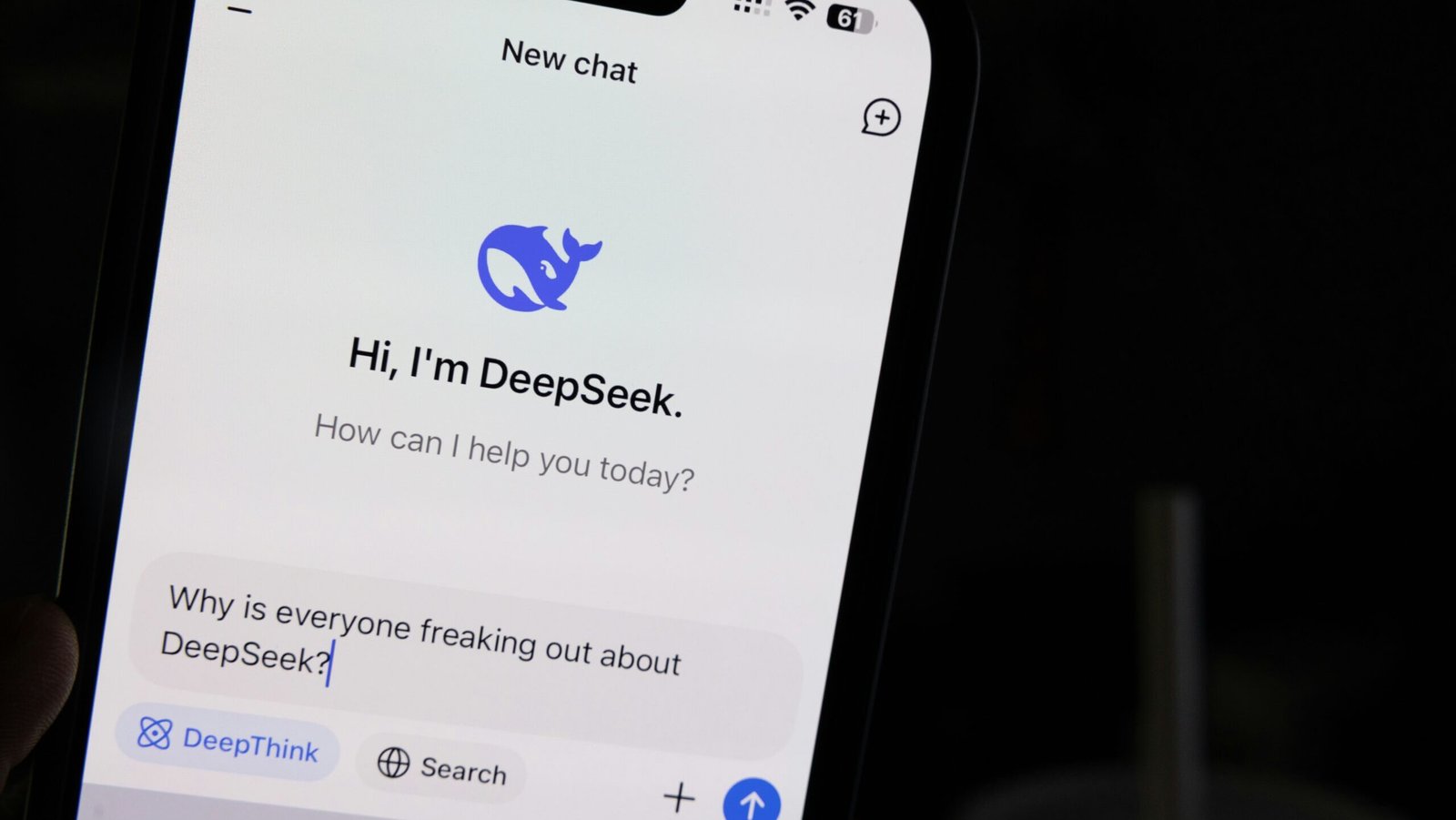AI Insights
China’s Revolutionary DeepSeek Turns to American Hardware for Upgrade

When Chinese artificial intelligence startup DeepSeek debuted a chatbot that it said rivaled the best the United States had to offer, and at a fraction of the cost, venture capitalist Marc Andreesen called it “AI’s Sputnik moment.”
Seven months later, it appears DeepSeek needs some American rocket power to get its AI Sputnik off the ground. A Financial Times report on Thursday revealed that the release of DeepSeek’s new model was delayed after attempts to train it using chips from China’s Huawei failed.
Chip Shot Comes Up Short
After DeepSeek released its chatbot, based on the DeepSeek-R1 model, in January and saw it climb all the way to the top of Apple’s iOS App Store, Nvidia’s market value shed a stunning $600 billion, or 18% of its value. It was the biggest single-day loss for a stock in US history.
Nvidia, of course, has more than recovered: Last month, it became the world’s first $4 trillion company, as investments and improvements in AI models have continued unabated following the initial shock caused by the revelation of a highly efficient Chinese competitor to US AI models. In fact, it seems DeepSeek’s forthcoming model will depend on Nvidia before it finds its way to the App Store:
- Multiple sources told the FT that when the AI startup tried training its R2 model using Ascend chips made by China’s Huawei, they were insufficient for vast datasets, a crucial component of the development process. That left the company using Nvidia chips for training, and Huawei chips were used only for inference, which in AI refers to the step where an already trained machine learning model applies its training knowledge to newly introduced data (the simplest example being when someone asks a chatbot a question).
- While Nvidia recently struck an agreement with Washington to sell its H20 chips in China for a 15% cut of the revenue, Beijing has pressured companies there to use alternative technology developed by China’s Cambricon and Huawei. The problem is their chips suffer from greater stability issues, offer slower inter-chip connectivity between different circuits, and run on inferior software — so it’s sort of like being asked to tie your hands behind your back.
Chipping Away: Even if they’re not up to the cutting edge of the cutting edge, Huawei’s Ascend 910B and 910C chips remain highly useful for AI developers, including TikTok owner ByteDance, and the company is set to ship hundreds of thousands of units in 2025. Earlier this year, Huawei began contacting companies about testing a new chip in the early stages of development, the Ascend 910D, which it hopes will leapfrog Nvidia’s widely used H100.
AI Insights
Varo Bank Appoints Asmau Ahmed as Chief Artificial Intelligence Officer to Drive AI Innovation

Varo Bank has hired Asmau Ahmed as its first Chief Artificial Intelligence and Data Officer (CAIDO) to lead company-wide AI and machine-learning efforts. Ahmed has over 20 years of experience in leading teams and delivering products at Google X, Bank of America, Capital One, and Deloitte. She will focus on advancing Varo’s mission-driven tech evolution and improving customers’ financial experiences through AI. Varo uses AI to enhance its credit-decisioning processes, and Ahmed’s expertise will help guide future institution-wide advancements in AI.
Title: Varo Bank Appoints Asmau Ahmed as Chief Artificial Intelligence and Data Officer
Varo Bank, the first all-digital nationally chartered bank in the U.S., has announced the hiring of Asmau Ahmed as its first Chief Artificial Intelligence and Data Officer (CAIDO). Ahmed, who brings over 20 years of expertise in innovation from Google, Bank of America, and Capital One, will lead the company’s AI and machine-learning efforts, reporting directly to CEO Gavin Michael [1].
Ahmed’s appointment comes as Varo Bank continues to leverage AI to enhance its core functions. The bank has expanded credit access by using data and advanced machine learning-driven decisioning, reinforcing its mission of advancing financial inclusion with technology. The Varo Line of Credit, launched in 2024, uses self-learning models to improve its credit-decisioning processes based on proprietary algorithms, allowing some customers with reliable Varo banking histories access to loans that traditional credit score systems would have excluded [1].
Ahmed’s extensive experience includes leading technology, portfolio, and customer-facing product teams at Bank of America and Capital One, as well as co-leading the Digital Innovation team at Deloitte. She has also founded a visual search advertising tech company, Plum Perfect. Her expertise will be instrumental in guiding Varo Bank’s future advancements in AI.
“As a nationally-chartered bank, Varo is able to use data and AI in an innovative way that stands out across the finance industry,” said Ahmed. “Today we are applying machine learning for underwriting, as well as fraud prevention and detection. I am thrilled to lead the next phase of Varo’s mission-driven tech evolution and ensure AI can improve our customers’ experiences and financial lives” [1].
Varo Bank’s AI and data science efforts are designed to enhance various core functions of the company’s tech stack. The appointment of Ahmed as CAIDO underscores the bank’s commitment to leveraging AI to improve customer experiences and financial outcomes.
References
[1] https://www.businesswire.com/news/home/20250904262245/en/Varo-Bank-to-Accelerate-Responsible-and-Customer-Focused-AI-Efforts-with-New-Chief-Artificial-Intelligence-Officer-Asmau-Ahmed
AI Insights
Guest column—University of Tennessee “Embraces” Artificial Intelligence, Downplays Dangers – The Pacer
At the end of February, the University of Tennessee Board of Trustees adopted its first artificial intelligence policy.
The board produced its policy statement with little attempt to engage faculty and students in meaningful discussions about the serious problems that may arise from AI.
At UT Martin, the Faculty Senate approved the board’s policy statement in late April, also without significant input from faculty or students.
In Section V of the document, “Policy Statement and Guiding Principles,” the first subsection states: “UT Martin embraces the use of AI as a powerful tool for the purpose of enhancing human learning, creativity, analysis, and innovation within the academic context.”
The document notes potential problems such as academic integrity, the compromise of intellectual property rights and the security of protected university data. But it does not address what may be the most dangerous and most likely consequence of AI’s rapid growth: the limiting of human learning, creativity, analysis and innovation.
Over the past two years, faculty in the humanities have seen students increasingly turn to AI, even for low-stakes assignments. AI allows students to bypass the effort of trying to understand a reading.
If students attempt a difficult text and struggle to make sense of it, they can ask AI to explain. More often, however, students skip reading altogether and ask AI for a summary, analysis or other grade-directed answers.
In approaching a novel, a historical narrative or even the social realities of our own time, readers start with limited knowledge of the characters, events or forces at play. To understand a character’s motives, the relationship between events, or the social, economic and political interests driving them, we must construct and refine a mental image—a hypothesis—through careful reading.
This process is the heart of education. Only by grappling with a text, a formula or a method for solving a problem do we truly learn. Without that effort, students may arrive at the “right” answer, but they have not gained the tools to understand the problems they face—or to live morally and intelligently in the world.
As complex as a novel or historical narrative may be, the real world is far more complex. If we rely on AI’s interpretation instead of building our own understanding, we deprive ourselves of the skills needed to engage with that complexity.
UT Martin’s mission statement says: “The University of Tennessee at Martin educates and engages responsible citizens to lead and serve in a diverse world.” Yet we fail this mission in many ways. Most students do not follow current events and are unaware of pressing issues. Few leave the university with a love of reading, despite its importance to responsible citizenship.
With this new AI policy, the university risks compounding these failures by embracing a technology that may further erode students’ ability to think critically about the world around them.
AI Insights
Artificial intelligence can predict risk of heart attack – The Anniston Star
-

 Business6 days ago
Business6 days agoThe Guardian view on Trump and the Fed: independence is no substitute for accountability | Editorial
-
Tools & Platforms3 weeks ago
Building Trust in Military AI Starts with Opening the Black Box – War on the Rocks
-

 Ethics & Policy1 month ago
Ethics & Policy1 month agoSDAIA Supports Saudi Arabia’s Leadership in Shaping Global AI Ethics, Policy, and Research – وكالة الأنباء السعودية
-

 Events & Conferences4 months ago
Events & Conferences4 months agoJourney to 1000 models: Scaling Instagram’s recommendation system
-

 Jobs & Careers2 months ago
Jobs & Careers2 months agoMumbai-based Perplexity Alternative Has 60k+ Users Without Funding
-

 Education2 months ago
Education2 months agoVEX Robotics launches AI-powered classroom robotics system
-

 Funding & Business2 months ago
Funding & Business2 months agoKayak and Expedia race to build AI travel agents that turn social posts into itineraries
-

 Podcasts & Talks2 months ago
Podcasts & Talks2 months agoHappy 4th of July! 🎆 Made with Veo 3 in Gemini
-

 Podcasts & Talks2 months ago
Podcasts & Talks2 months agoOpenAI 🤝 @teamganassi
-

 Education2 months ago
Education2 months agoMacron says UK and France have duty to tackle illegal migration ‘with humanity, solidarity and firmness’ – UK politics live | Politics






















